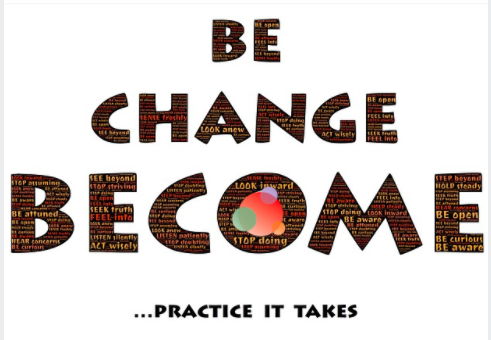 It’s no surprise the role of the communicator has changed drastically since 2008.
It’s no surprise the role of the communicator has changed drastically since 2008.
(I really can’t believe it’s been that long.)
With the advent of social media and blogging and social advertising and more, we’ve quickly had to learn new skills and adapt to new trends.
This is why, in 2014, I introduced the PESO model in Spin Sucks—the integrated communications model we’ve used for our clients for years.
It helps communicators think beyond the news release and understand that to truly build a brand, it has to include more than earned media.
We’ve had the “What is PR?” debate more times than I care to count and yet, we continue have to have it.
Leaders at some of the largest, global agencies still refer to public relations as media relations.
And, if we can’t agree on what it is that we do, how do we expect our clients or the executives with whom we work to know what we do?
The Trends Prove Evolution
If you take a look at Google Trends for the past five years, you can see that content marketing (blue), media relations (red), and influencer relations (yellow) follow the same pattern.
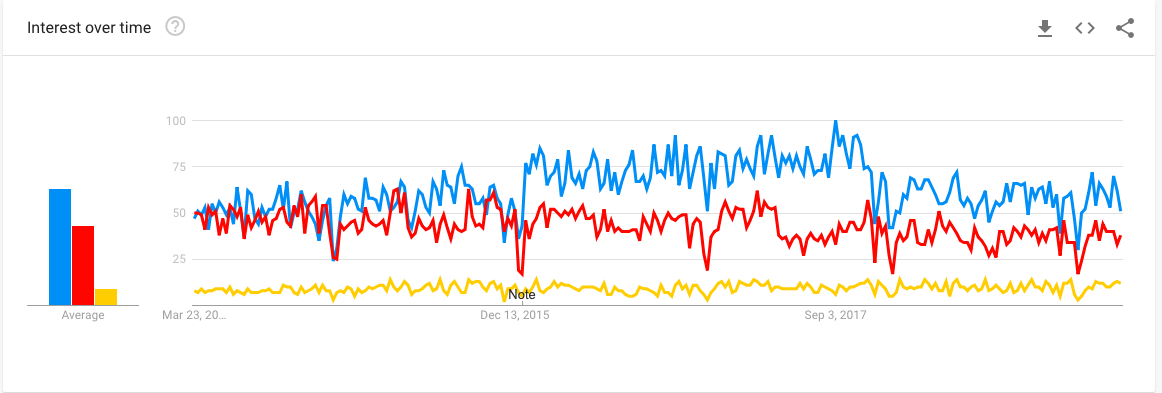
They all fluctuate, with major drops in interest the last two weeks of the year (no surprise there—no one is working).
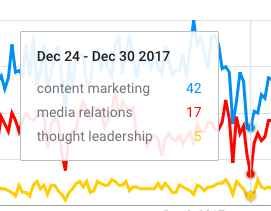
Now take a look at media relations (red) as compared to content marketing (blue).
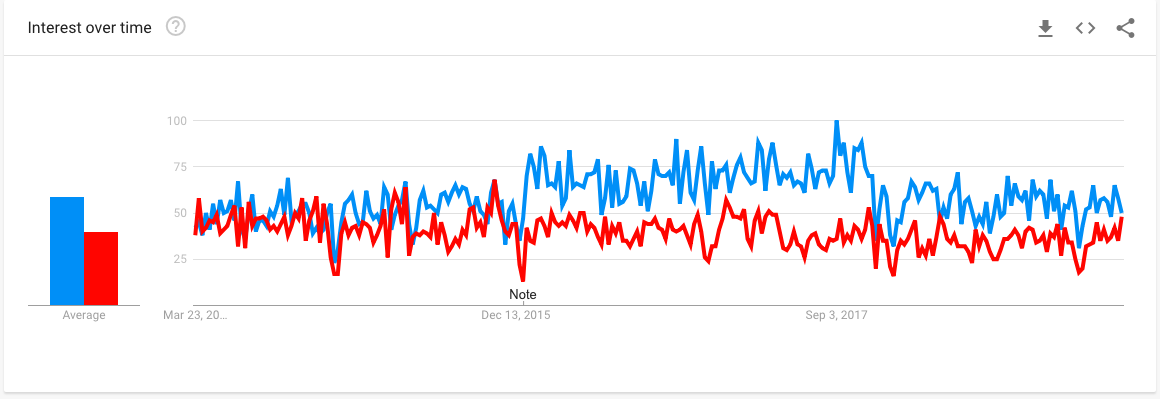
The trend has declined in the past five years for media relations, while content marketing continues to increase.
When you add SEO (green) on top of it (unfair comparison, really), everything gets blown away.
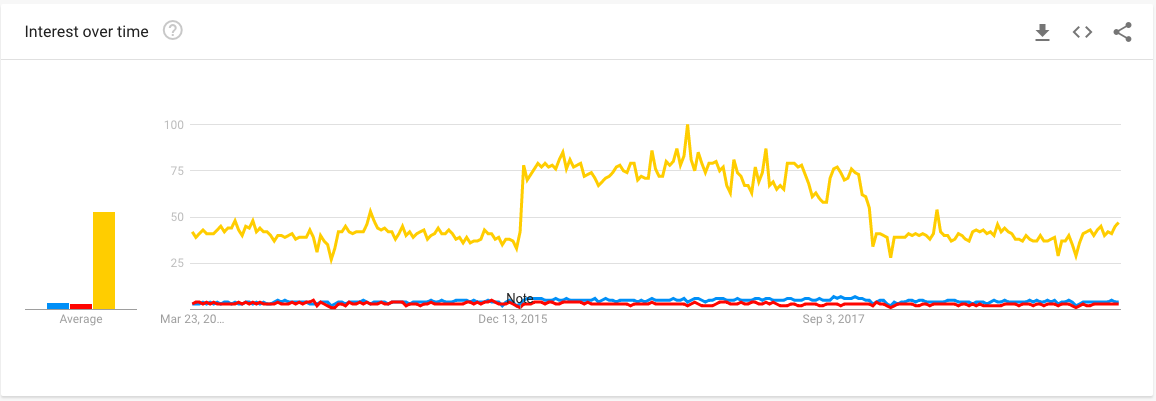
Five Ways to Learn New Skills
All of this to prove that our jobs have evolved and it’s up to us as individuals to learn new skills.
The communicator of today has myriad of skills, including content marketing, SEO, email marketing, social advertising, media relations, reputation management, social media, and measurement.
While it would be great if we could focus in on one area, that time has passed right by us.
If you do not evolve, learn new skills, and keep yourself up-to-date, you will not have the same career in five years.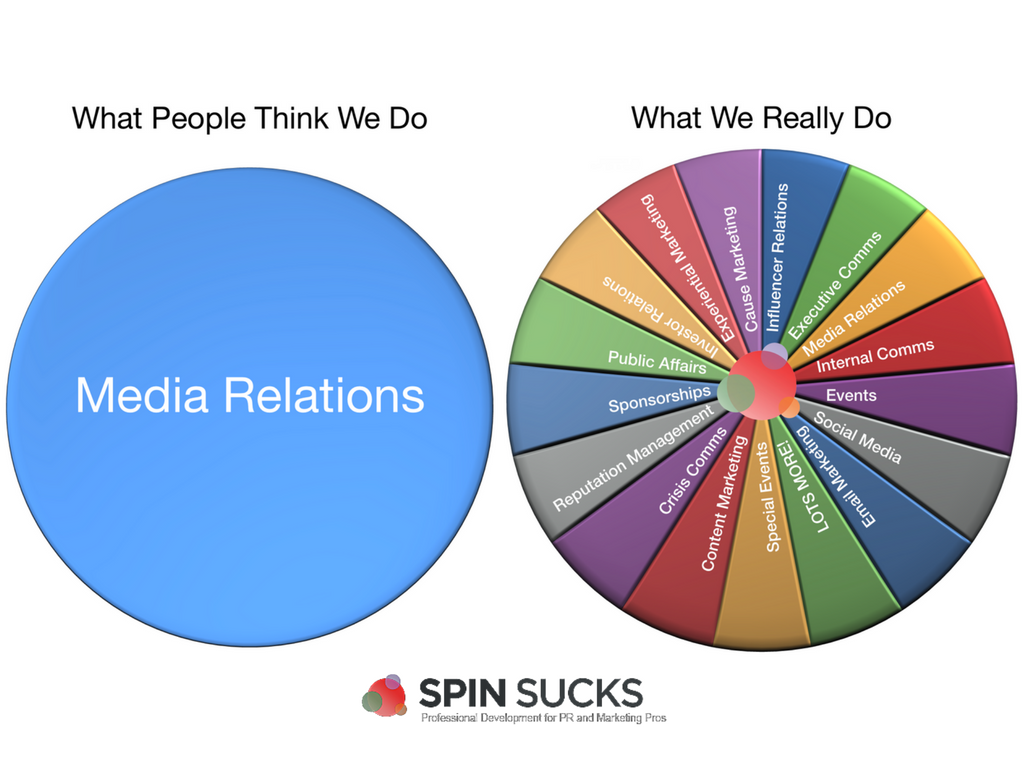
Let’s take a look at five ways you can evolve with the industry—and stay ahead of the trends.
Learn Strategy
I have a friend who is an executive at a Global 500 company. She recently said to me:
You know what’s wrong with the PR industry? Most don’t know what a strategy is or how to develop one.
That’s a real challenge.
As an industry, we tend to focus on the tactics and start there versus starting with the end (and the organization’s goals) in mind.
As you begin a new campaign, always think about what success looks like in the end.
Picture what will have had to happen for you to reach your vision.
- Will you have built a community? What does that look like?
- Will you have everyone talking about your brand? What will that include?
- How many people will you have in the nurturing pipeline?
- What kinds of sales will you have created?
After you know what you want to accomplish, you can work backward to figure out how you’ll get there.
The what is the strategy and, until you know that, you won’t be successful in any of these other things.
Devote to Professional Development
I know this is easier said than done because, well, time.
But the only way you can evolve and learn new skills is to go back to school, so to speak.
It used to be, if you wanted to take on anything new, you had to go get a graduate degree at a university.
That is no longer the case.
Today you can take LinkedIn Learning or Coursera online courses.
(Also, for personal interests, I LOVE Masterclass and Skillshare.)
Many marketing organizations have online courses, such as Content Marketing Institute, MarketingProfs, and Spin Sucks.
Attend conferences, take zillions of notes, and then apply (see the next tip).
Some of my favorites include Content Jam, Content Marketing World, and MarketingProfs B2B Forum.
And, of course, read.
Nothing is better than reading books and blogs to get ideas and provide fodder for creativity.
Experiment, Take Risk, and Tweak
How many of you have pages and pages of notes from events you’ve attended, books you’ve read, and courses you’ve taken?
It’s OK…I do, too.
But what good does that do you?
When I read really great books and come away with pages of notes, that’s all they are: notes.
But if you want to experiment and test some of what you’ve learned (and get through a growing task list), you have to set time aside every week. Just an hour. Once a week. With the sole purpose of putting some of the ideas to test.
Don’t let it sit in your browser in one of a zillion tabs or in Pocket where you might get to it eventually or in your notebook, collecting dust.
Do it now.
Get Really Good at SEO
I often call what we do “on-page SEO.”
This means, is the content that you read, see, and hear that is optimized.
You can certainly leave the back-end/development SEO to the pros, but communicators have to learn how on-page SEO works.
This starts with keyword research, content planning, publication, distribution, influencer relations, social media, and more.
While some of you may be excellent content producers and people flock to your content, no matter how well (or not) it’s optimized, the rest of us need some help.
Learn how to optimize your content so both Google and humans can find it.
Don’t Be Afraid to Outsource
We have never before been in a situation where it is so easy to outsource.
If I’d had Virtual Staff Finder and Upwork when I started my business, I guarantee I would not have had the bank calling my line of credit when the economy crashed.
It’s extraordinarily efficient to hire someone to do project work or become a full-time <insert need> freelancer with services like these.
But…people are scared. I hear it every day:
I’m just not comfortable hiring someone outside of this country.
I am living, breathing proof that that is a silly fear.
We have employees in Europe, Canada (which I guess doesn’t really count as outside of this country), and the Philippines.
And there is zero difference in their work compared to those in the U.S.
The only difference is in how you pay them, which isn’t scary enough to not do it.
If you test an idea that you’ve just learned and need some extra help to get it done, use one of those services.
I guarantee you’ll be hooked.
Create Your Future
We’re in an exciting—albeit scary—time and, for those of you who fear change, this is going to be hard.
But you can take the bull by the horns now, while you’re in control, or you can wait until the industry evolves so much, it pushes you out.
I know that fear is undone by crisis, but why put yourself through that?
Create the opportunity for you now to learn new skills, adapt to these changes, and evolve.
If you do, I promise you’ll not only be happier at work (and more marketable), you won’t find yourself in a crisis in three to five years.